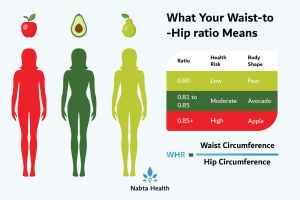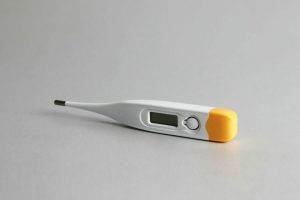Factors that Contribute to Transient, PCOS-like Symptoms

- PCOS- like symptoms can be described as temporary infertility.
- There are multiple reasons why a woman might experience PCOS-like symptoms but not actually be diagnosed with PCOS.
- Diagnosing PCOS is very difficult because the symptoms are associated with other conditions.
- It is important to determine what the underlying cause of your PCOS-like symptoms is.
In some cases, women experience symptoms akin to those of Polycystic Ovary Syndrome (PCOS) because of an underlying medical condition, a change in diet, or withdrawal from a medication. Perhaps it is inaccurate to categorise these women as having PCOS and a better description is temporary infertility due to hormonal imbalance or ovarian malfunction.
You can track your ovulation cycle using Nabta’s period and ovulation tracker app to understand if your PCOS-like symptoms are associated with your fertility.
What is causing my PCOS-like symptoms?
Thyroid disease. Hypothyroidism causes irregular periods. It is also associated with impaired insulin sensitivity and therefore, could feasibly exacerbate the defining characteristics of classic PCOS. An underactive thyroid, which is the predominant cause of thyroid-related menstrual cycle irregularities, can be effectively treated with thyroid hormones.
Zinc deficiency. Sometimes changing to a strict vegetarian or vegan diet can have an impact on health. Zinc seems to play a very important role in regulating ovarian function; however, as some of the best sources of the mineral are meat and shellfish, it is not uncommon for vegetarians to be deficient in it. Dietary zinc levels can be restored by increasing the intake of legumes, nuts and seeds, or taking zinc supplements.
The pill. The oral contraceptive pill, introduced in the 1950s, was ground-breaking in enabling women to take control of their own bodies and instigate true family planning. Developed initially to prevent pregnancy, the pill works by blocking ovulation and reducing the levels of oestrogen and progesterone. This disruption of endogenous hormone levels has meant that more recently it has also been used as a tool to manage heavy periods and treat some of the symptoms of endometriosis.
The problem some women face is that they continue to have abnormal ovulation for months, or even years, after they stop taking the pill. Some clinicians go as far as describing it as a form of PCOS. However, this is contentious and probably a little inaccurate, as most women will experience anovulation in isolation without hyperandrogenism or polycystic ovaries. Most recommended guidelines stipulate that for a diagnosis of PCOS a female should have two out of three of the following symptoms:
- Anovulation
- Hyperandrogenism
- Polycystic ovaries.
However, the scientific and medical communities at large do agree that impaired fertility after years of pill use is a pressing concern. As more women take the pill over a longer time period, this problem is likely to grow over the coming years, necessitating an urgent need for doctors to better understand the long-term effects of hormonal contraception.
Fortunately, pill-induced ovulatory disorders are usually temporary, requiring time and patience for full symptomatic relief. Herbal remedies have been shown to have some beneficial effects. Naturopathic doctors can use the levels of circulating hormones to determine which herbal treatments are most likely to be beneficial on a case by case basis. Peony & liquorice and chaste berry (Vitex) are two examples.
Why is diagnosing PCOS and its associated conditions so difficult?
PCOS is a challenging condition to diagnose, in part because the different clinical symptoms are strongly associated with other medical conditions. For example:
- Anovulation (and consequently a difficulty in getting or staying pregnant) is commonly seen with pituitary disease, thyroid disease, anaemia and anorexia.
- Hyperandrogenism can occur as a result of adrenal hyperplasia or cancer.
- Polycystic ovaries, despite their name, are not specific to PCOS, and can be a normal ovarian feature.
Thus, it is essential to determine what the underlying cause of your PCOS-like symptoms is. Only in doing this, will you be able to manage the negative effects, using medication, dietary changes, lifestyle adaptations or supplementation as required.
Nabta is reshaping women’s healthcare. We support women with their personal health journeys, from everyday wellbeing to the uniquely female experiences of fertility, pregnancy, and menopause.
Get in touch if you have any questions about this article or any aspect of women’s health. We’re here for you.
Sources:
- Azziz, Ricardo, et al. “The Androgen Excess and PCOS Society Criteria for the Polycystic Ovary Syndrome: the Complete Task Force Report.” Fertility and Sterility, vol. 91, no. 2, 2009, pp. 456–488., doi:10.1016/j.fertnstert.2008.06.035.
- Koutras, D A. “Disturbances of Menstruation in Thyroid Disease. ” Annals of the New York Academy of Sciences, vol. 816, 17 June 1997, pp. 280–284.
- Tian, X, and F J Diaz. “Zinc Depletion Causes Multiple Defects in Ovarian Function during the Periovulatory Period in Mice.” Endocrinology, vol. 153, no. 2, Feb. 2012, pp. 873–886., doi:10.1210/en.2011-1599.










